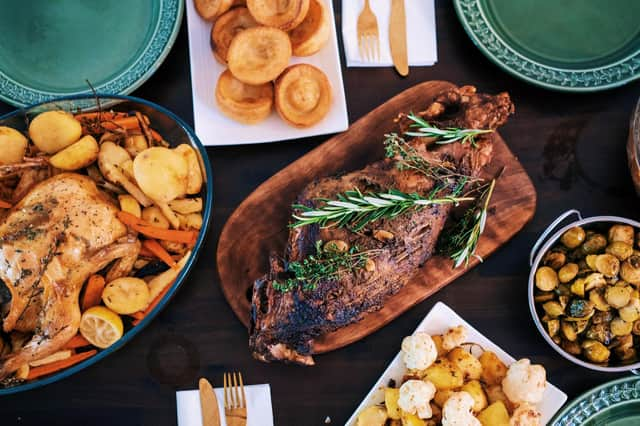Top tips to avoid festive food 'comas'
This article contains affiliate links. We may earn a small commission on items purchased through this article, but that does not affect our editorial judgement.


Overindulging and excessive eating and drinking can have a negative impact on the body with bloating, digestive issues and fatigue all common symptoms of festive gatherings.
No one wants to miss out on festivities with family and friends after falling into a state of drowsiness for hours after eating. For those that often find themselves feeling sleepy after their lunch, Ali Orr nutritional therapist at food intolerance test specialist York Test has provided her tips to help people avoid seasonal food comas.
Pace your eating
Advertisement
Hide AdAdvertisement
Hide AdOverindulgence is typically the main trigger for that afternoon slump, we fill up and then fill up some more. Often, we wake up and start picking at the sweets as soon as they’re out of the stocking.
On many occasions, this kind of eating is squeezed into a short amount of time, which makes it easy to eat too much, too quickly. This kind of overconsumption puts pressure on the digestive system and unsurprisingly leads to a slump in energy in the afternoon.
To help prevent overindulgence, start the day earlier and pace out the meal, ideally leaving at least an hour to 90 minutes between meals to allow for food to digest properly.
Start the day right
A high protein festive breakfast such as scrambled eggs with bacon or eggs benedict, is both a tasty and effective start to the day. This type of breakfast helps to stabilise blood sugars and fill you up enough to prevent you getting ravenously hungry later on in the day, which inevitably leads to overeating.
Advertisement
Hide AdAdvertisement
Hide AdA protein-packed breakfast will also reduce the urge to snack before lunch. Once you’ve had breakfast don’t eat until lunch, you’ll build an appetite and enjoy your Christmas dinner all the more.
Prioritising protein again at your Christmas lunch will help fill you up. Protein is harder to digest so the energy is slower to be released into the bloodstream, this prevents that slump we can often get from eating too many sugary treats that are easy to digest.
Watch for tryptophan
The main meal at many Christmas Day feasts is usually laden with lots of fat and carbs. Turkey contains tryptophan, one of several essential amino acids, which combines with the high carbohydrate content of bread and stuffing to cause the slump at the end of the meal.
Reducing the turkey portion size and minimizing the bread sauce consumption could help to keep energy levels high, without taking away too much enjoyment from the meal.
Advertisement
Hide AdAdvertisement
Hide AdSwap in healthier choices
There are dozens of options where swapping traditional ingredients out for a slightly healthier alternative could create a delicious meal while avoiding the food coma which so many have come to associate with the afternoon on Christmas Day.
Instead of doing a traditional stuffing, consider making an alternative using quinoa, cranberries and walnuts with the same spices and herbs you would use in stuffing. Stick with the vegetarian recipes instead of traditional pork-based stuffing for a lighter option.
Mashed potatoes can be made healthier by using yellow potatoes, and instead of using milk and butter, drain the water and use that to whip the potatoes. Add a little salt and pepper and you would never know that the milk and butter hasn’t been used.
Listen to your body
Advertisement
Hide AdAdvertisement
Hide AdTune into your body and become aware when you’re starting to feel full, try to stop once you are about 80% there, allow room for dessert. Have a smaller portion of dessert, it is the first three mouthfuls that we enjoy the most, take the time to enjoy every bite.
Have a break from eating, if it’s a nice afternoon pop out for a brisk walk to help support the digestive process. Then avoid food until you build up a little hunger in the evening. Just because it’s Christmas doesn’t mean you have to continuously eat over the whole day. In fact, only eating at mealtimes can allow you to enjoy and savour the food more, and if you’re lucky there’ll be leftovers for Boxing Day.
Be aware of food intolerances
Using data based on the results of tens of thousands of people who have taken a food intolerance test in the UK , YorkTest estimates that more than 40% of Brits could have a high reactivity to common ingredients found on the Christmas dinner table. So, if you are hosting Christmas this year, it’s important to consider the requirements of your guests.
It’s always helpful to be aware of your personal food intolerances as well as those of your guests. There is a huge array of alternative ingredients which can reduce the chances of a reaction, making a delicious Christmas dinner without the post festive slump.
Advertisement
Hide AdAdvertisement
Hide AdIn the end, it’s Christmas, do the best you can with these tips and enjoy the time with family and friends.
YorkTest’s food intolerance tests analyse IgG reactions to over 200 food and drink ingredients. IgG is a type of antibody, or immune response, which can be formed when you react to foods. YorkTest defines food intolerance as a food-specific IgG reaction. The YorkTest food intolerance test is not an allergy, coeliac or lactose intolerance test.
For more information visit https://www.yorktest.com/ website